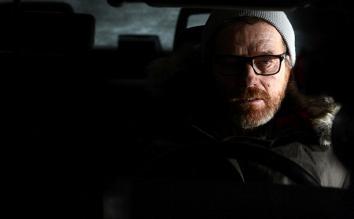I’m with you, Emily: That was a wonderfully satisfying conclusion. I didn’t mind the lack of jaw-dropping surprises, because that slow unraveling made such perfect emotional sense. The only moment that made me let out an audible gasp was when the red dots appeared on Gretchen and Elliott’s chests. I knew that Walt’s story about hiring the best hit men west of the Mississippi was pure bluster, but when Badger and Skinny Pete emerged from the woods and jumped into his car, I giggled with glee. It’s a rare show that can shoehorn silly laughs into the middle of deep dramatic catharsis.
I, too, lost my hatred for Walt this episode. Like you, I let go of it for good when he finally came clean to Skyler, but I’d called a truce back when he conned Susan into handing over the Schwartzes’ home address. Partly it was his sheer resourcefulness that won me over, but mostly it was that he seemed to have gotten his ego under control. So often Walt’s attempts at deception were spoiled by the tone of self-satisfaction that he couldn’t keep out of his voice. (In fact, of course, that tone was carefully inserted by Bryan Cranston.) Now he was exploiting other people’s vanity by using a flattering newspaper profile as bait to get what he needed.
I loved Walt’s amble through the Schwartzes’ swank home in Tesuque, casually picking up and examining family photos. It reminded me of Marie’s Season 4 real-estate fantasies, except that whereas kleptomaniac Marie used to slip a spoon or some other small item into her purse, Walt broke into the house and deposited millions of dollars of cash. Despite all my demands for more information about the disintegration of Gray Matter, I’m satisfied with what I got. Walt’s intonation when he asked Elliott, “I can trust you to do this?” convinced me that he had been wronged all those years ago. And while I still believe Walt made a big mistake when he refused the Schwartzes’ offer to pay for his cancer treatment, the force of his insistence that they not contribute a dime of their own money to Flynn’s windfall persuaded me that his attitude was at least based a matter of principle.
Vince Gilligan put his thumb on the scale when he created Walt’s final big bad—Uncle Jack and his gang weren’t just murderous racists, they had enslaved and abused Jesse. But in the complex morality of Breaking Bad, it wasn’t their loathsome views that doomed them, it was their sloppiness.
Because while love was indeed the show’s central theme, it also celebrated virtuosity. Jesse’s dissociative fantasy of making that gorgeous wooden box wasn’t just a slave’s dream of freedom—it was a reminder of his superb technical skills as a meth cook. Walt didn’t just create the blue meth (and teach his secrets to Jesse), he was also capable of building a diabolical bell-operated bomb to kill Gustavo Fring and MacGyvering together a key fob and a big-ass gun to take out a whole clubhouse full of Aryans.
The others were too prone to carelessness: The white supremacists allowed Walt into their compound for no good reason. Lydia was far too schedule-oriented, not to mention hopelessly addicted to Stevia, which allowed Walt to set his trap. Todd had potential—when Walt begged to meet with Jack and the gang, Todd was smart enough to see that they shouldn’t even consider it—but he was so crushed out on Lydia that he allowed her to overrule his good instincts. He was also completely under the sway of his wicked uncle.
So while Todd survived the initial round of slaughter, no one could blame Jesse for garroting the child-murdering, Brock-threatening psychopath with his handcuff chains. Walt expired, too, of course, but as Lydia said so condescendingly—and shortsightedly—to Todd, they did him a favor in the end. His days were numbered anyway; at least he got to say a proper goodbye to Skyler.
Now Jesse is a free man. He’s horribly scarred by everything that happened to him—and wracked by guilt for some of the things he did to others—but now he has a chance to start again. He’s like the guy in the Marty Robbins song that played in Walt’s getaway truck: “I saddled up and away I did go,/ Riding alone in the dark./ Maybe tomorrow/ A bullet may find me./ Tonight nothing’s worse than this/ Pain in my heart.
That lonesome cowboy took one in the chest a little while later, but he didn’t have Jesse Pinkman’s smarts—or his sweet, broken heart.
Cheer up, beautiful people,
June
—
Related in Slate: Willa Paskin on how the Breaking Bad finale revealed that Vince Gilligan was Team Walt all along.
